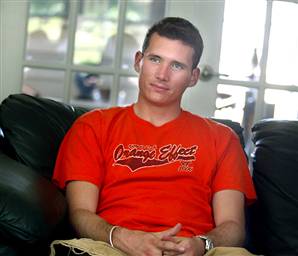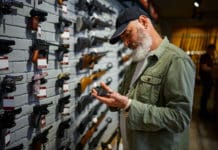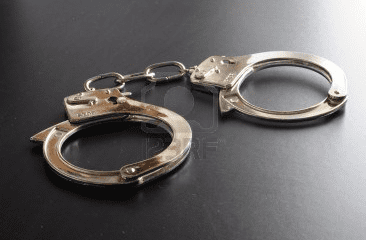Two days ago, Virginia Tech shooting victim Colin Goddard testified in front of the House Judiciary’s Crime Sub-Committee forum. Note: forum. In other words, a get-together hosted by advocates of legislation that would require firearms buyers at gun shows (and everywhere else) to run any and all sales through an FFL dealer, for an FBI criminal background check (and a $25 fee). It should be pointed out that the Virginia Tech killer purchased his weapons at a gun dealer (not a gun show) and passed his BCCI check. Twice.
Now, the fact is Congressmen, I wouldn’t be sitting in front of you today if it weren’t for the events that took place at Virginia Tech on April 16th, 2007. I wouldn’t be sitting in front of you today if it weren’t for the 10 minutes of hell that I survived on that day.
And I wouldn’t be sitting in front of you today if it weren’t for all the things I have learned in my search for answering “Why” and “How” am I still alive.
What started off as a typical day in a small town school in southwest Virginia, soon further expanded our definition of the worst mass-shooting in US history. Midway through my 9:00am French class, we began to hear muffled banging noises coming from somewhere outside of our classroom.
As soon as our teacher went to investigate the sounds, she slammed the door shut and told us to get under our desks and for someone to call 911. I took out my phone and, as I later found out, placed the only call to the police by someone in the building. The next 10-minute period was the longest 10-minute period of my entire life. It felt like hours.
From the floor in the back of my classroom, I took one glance at the front of the room where my teacher had stood and instead saw a man with two holsters over his shoulders begin to turn towards me and down my aisle of desks. I never saw his face. I had nowhere to escape and no time to react or even think. As I turned my head back, I told the voice on the other end of the phone that he was here, but I still didn’t totally understand what that meant. The only decision that I was left with was to act as if I was already dead.
The force of the first bullet caused me to throw the phone from my hand and it landed next to the head of a girl named Emily. She picked it up and remained on the call with the police the entire time. Emily was ultimately able to give the dispatcher his location and help the SWAT team to get to us.
What was once a set of seemingly unusual bangs had now became a constant thunder of gunfire. It would pause momentarily while he changed out his extended ammunition magazines. The intensity of those sounds did vary slightly while he traveled back and forth between the three rooms. There were also screams in the beginning but generally nobody really saying anything.
Each time he came back into our room I was shot again. The second and third time in both my hips and the fourth time through my right shoulder. I don’t ever remember thinking I was going to die however. I just kept thinking that I couldn’t believe this was really happening to me. It was so surreal. There were times I felt like I was almost dreaming.
But this dream was finally interrupted by silence. As quickly as everything started, it all just stopped. By this point you could hear the police were very close. I thought he was hiding in our room and waiting to engage them when they entered. But as soon as the police came into our room I heard them say, “Shooter down,” and realized that he had committed suicide in the front of our classroom. I then heard the EMT’s begin their triage and they said, “This one’s yellow, this one’s red” then “black tag, black tag, black tag.” This is when I knew some of my classmates were dead.
I put one hand up on a desk to let them know I was alive. They marked me as yellow, dragged me out into the hallway, and it was there that I began the long road to recovery. Today, I still carry 3 bullets with me and a newly implanted titanium rod in my body.
The fact is, Congressmen, I wouldn’t be sitting in front of you today if it wasn’t for that 10-minute experience that changed my life.
I wouldn’t be sitting in front of you today if it weren’t for the phone call I made and the exceptional work of the law enforcement agencies that responded.And finally, as simply as I can put it, I wouldn’t be sitting in front of you today if our federal gun laws had been stronger. If Seung-Hui Cho, who had a known mental health history that disqualified him from purchasing firearms, had had his record uploaded to the NICS background check system as required, I wouldn’t be here in front of you today. The existing federal law at the time was too weak to protect me and my classmates, as it was intended to do.
So the fact is, I shouldn’t be sitting in front of you today.
When we learned that fact, that Cho’s mental health records should have disqualified him from purchasing firearms through the legal way he did, we worked with Congress to help ensure that states were getting more records uploaded into the National Instant Check System (NICS). This was a good first step, however it should be known that this improvement has yet to be applied in every state. This weakness then opened my eyes to the greater patchwork of state and federal laws in our country. And what I learned surprised me.
What I learned was that many of our state and federal gun laws are written in ways to make them ineffective and unenforceable. Even if Cho had been properly turned down during a background check from the gun dealer, he could have easily attended any of the dozens of gun shows that take place throughout Virginia each weekend and bought the same weapons from a “private seller” with no background check into his mental history, and no questions asked. I know this first hand, and I tried to demonstrate it all to you with the video that you just saw. The existing Brady Act, as it is written, is too weak to protect future Americans from another Seung-Hui Cho or other prohibited purchasers.
Last summer, I traveled all over the country visiting gun shows in an attempt to expose the Gun Show Loophole. I passed right by all the licensed dealers responsibly conducting background checks and went right through the loophole over and over again. I went to shows in Texas, Ohio, Maine, Minnesota and right across the river in my home state of Virginia. I was amazed at how quick and easy it was getting my hands on just about any type of weapon I could imagine.
I bought, or watched a friend buy, 9mm’s, 22’s, Tech-9’s, and Mack-11’s. I bought an AK-47 without showing any ID or going through any background check. I even bought the same type of gun that shot me. Each transaction took less than 5 minutes. And when I was done, either I, or the purchaser I went with, would turn all weapons over to the police. The sickening thing about what I did and the footage you just saw was that everything was completely legal under our current law.
I can think of NO reasonable, responsible, logical reason why that should be. I can think of no reason why the Gun Show Loophole should exist. Why should sellers at one table be required to run background checks, when the sellers, literally two tables down – with the exact same weapons – are allowed to sell their guns to anyone who just has the cash in hand? The reasonable, responsible answer is: They shouldn’t.
It’s no mystery why the guns sold by so-called “private sellers” are often more expensive than the exact same model sold by licensed gun dealers. Purchasers who know they can’t pass a background check are willing to pay a premium. One seller told me straight up, and I quote, “No paperwork, no tax, that’s gotta be worth something.” For gun traffickers, domestic abusers and felons who can’t pass a background check, that’s worth plenty.
The fact is, since the Brady Act began requiring background checks only on licensed dealers, it has denied, and thus prevented, more than 2 million firearms from falling into the hands of dangerous prohibited purchasers. So it’s only logical that this number would increase if the background check is further applied to private sellers dealing guns at gun shows because everyone knows that’s an easy way to get around it.
My personal experiences provide ample evidence as to why our federal gun laws need to be strengthened. Getting more records into the NICS system is absolutely important. But without applying these records on a broader scale, that means, without, at least, applying the background check to private sellers at public gun shows, all the new records in the world aren’t really any more useful. And I’m here to tell you, first-hand, that ineffective laws that put guns in the hands of the wrong people are a serious threat to the public safety of your citizens. My experiences since April 16, 2007 have lead me to conclude that it is far too easy for dangerous people to get their hands on dangerous weapons in this country. So today, the gun show loophole must be closed.
The fact is, Congressmen, I wouldn’t be sitting here in front of you today if I didn’t believe, with every part of me, that this is the right thing to do.
I wouldn’t be sitting here in front of you today if I didn’t know that closing the Gun Show Loophole will save American lives.
And finally, I wouldn’t be sitting here in front of you today if I didn’t believe that my elected officials will do what is reasonable and right to protect their citizens.
Now, the fact is Congressmen, I wouldn’t be sitting in front of you today if it weren’t for the events that took place at Virginia Tech on April 16th, 2007. I wouldn’t be sitting in front of you today if it weren’t for the 10 minutes of hell that I survived on that day.
And I wouldn’t be sitting in front of you today if it weren’t for all the things I have learned in my search for answering “Why” and “How” am I still alive.
What started off as a typical day in a small town school in southwest Virginia, soon further expanded our definition of the worst mass-shooting in US history. Midway through my 9:00am French class, we began to hear muffled banging noises coming from somewhere outside of our classroom.
As soon as our teacher went to investigate the sounds, she slammed the door shut and told us to get under our desks and for someone to call 911. I took out my phone and, as I later found out, placed the only call to the police by someone in the building. The next 10-minute period was the longest 10-minute period of my entire life. It felt like hours.
From the floor in the back of my classroom, I took one glance at the front of the room where my teacher had stood and instead saw a man with two holsters over his shoulders begin to turn towards me and down my aisle of desks. I never saw his face. I had nowhere to escape and no time to react or even think. As I turned my head back, I told the voice on the other end of the phone that he was here, but I still didn’t totally understand what that meant. The only decision that I was left with was to act as if I was already dead.
The force of the first bullet caused me to throw the phone from my hand and it landed next to the head of a girl named Emily. She picked it up and remained on the call with the police the entire time. Emily was ultimately able to give the dispatcher his location and help the SWAT team to get to us.
What was once a set of seemingly unusual bangs had now became a constant thunder of gunfire. It would pause momentarily while he changed out his extended ammunition magazines. The intensity of those sounds did vary slightly while he traveled back and forth between the three rooms. There were also screams in the beginning but generally nobody really saying anything.
Each time he came back into our room I was shot again. The second and third time in both my hips and the fourth time through my right shoulder. I don’t ever remember thinking I was going to die however. I just kept thinking that I couldn’t believe this was really happening to me. It was so surreal. There were times I felt like I was almost dreaming.
But this dream was finally interrupted by silence. As quickly as everything started, it all just stopped. By this point you could hear the police were very close. I thought he was hiding in our room and waiting to engage them when they entered. But as soon as the police came into our room I heard them say, “Shooter down,” and realized that he had committed suicide in the front of our classroom. I then heard the EMT’s begin their triage and they said, “This one’s yellow, this one’s red” then “black tag, black tag, black tag.” This is when I knew some of my classmates were dead.
I put one hand up on a desk to let them know I was alive. They marked me as yellow, dragged me out into the hallway, and it was there that I began the long road to recovery. Today, I still carry 3 bullets with me and a newly implanted titanium rod in my body.
The fact is, Congressmen, I wouldn’t be sitting in front of you today if it wasn’t for that 10-minute experience that changed my life.
I wouldn’t be sitting in front of you today if it weren’t for the phone call I made and the exceptional work of the law enforcement agencies that responded.
And finally, as simply as I can put it, I wouldn’t be sitting in front of you today if our federal gun laws had been stronger. If Seung-Hui Cho, who had a known mental health history that disqualified him from purchasing firearms, had had his record uploaded to the NICS background check system as required, I wouldn’t be here in front of you today. The existing federal law at the time was too weak to protect me and my classmates, as it was intended to do.
So the fact is, I shouldn’t be sitting in front of you today.
When we learned that fact, that Cho’s mental health records should have disqualified him from purchasing firearms through the legal way he did, we worked with Congress to help ensure that states were getting more records uploaded into the National Instant Check System (NICS). This was a good first step, however it should be known that this improvement has yet to be applied in every state. This weakness then opened my eyes to the greater patchwork of state and federal laws in our country. And what I learned surprised me.
What I learned was that many of our state and federal gun laws are written in ways to make them ineffective and unenforceable. Even if Cho had been properly turned down during a background check from the gun dealer, he could have easily attended any of the dozens of gun shows that take place throughout Virginia each weekend and bought the same weapons from a “private seller” with no background check into his mental history, and no questions asked. I know this first hand, and I tried to demonstrate it all to you with the video that you just saw. The existing Brady Act, as it is written, is too weak to protect future Americans from another Seung-Hui Cho or other prohibited purchasers.
Last summer, I traveled all over the country visiting gun shows in an attempt to expose the Gun Show Loophole. I passed right by all the licensed dealers responsibly conducting background checks and went right through the loophole over and over again. I went to shows in Texas, Ohio, Maine, Minnesota and right across the river in my home state of Virginia. I was amazed at how quick and easy it was getting my hands on just about any type of weapon I could imagine.
I bought, or watched a friend buy, 9mm’s, 22’s, Tech-9’s, and Mack-11’s. I bought an AK-47 without showing any ID or going through any background check. I even bought the same type of gun that shot me. Each transaction took less than 5 minutes. And when I was done, either I, or the purchaser I went with, would turn all weapons over to the police. The sickening thing about what I did and the footage you just saw was that everything was completely legal under our current law.
I can think of NO reasonable, responsible, logical reason why that should be. I can think of no reason why the Gun Show Loophole should exist. Why should sellers at one table be required to run background checks, when the sellers, literally two tables down – with the exact same weapons – are allowed to sell their guns to anyone who just has the cash in hand? The reasonable, responsible answer is: They shouldn’t.
It’s no mystery why the guns sold by so-called “private sellers” are often more expensive than the exact same model sold by licensed gun dealers. Purchasers who know they can’t pass a background check are willing to pay a premium. One seller told me straight up, and I quote, “No paperwork, no tax, that’s gotta be worth something.” For gun traffickers, domestic abusers and felons who can’t pass a background check, that’s worth plenty.
The fact is, since the Brady Act began requiring background checks only on licensed dealers, it has denied, and thus prevented, more than 2 million firearms from falling into the hands of dangerous prohibited purchasers. So it’s only logical that this number would increase if the background check is further applied to private sellers dealing guns at gun shows because everyone knows that’s an easy way to get around it.
My personal experiences provide ample evidence as to why our federal gun laws need to be strengthened. Getting more records into the NICS system is absolutely important. But without applying these records on a broader scale, that means, without, at least, applying the background check to private sellers at public gun shows, all the new records in the world aren’t really any more useful. And I’m here to tell you, first-hand, that ineffective laws that put guns in the hands of the wrong people are a serious threat to the public safety of your citizens. My experiences since April 16, 2007 have lead me to conclude that it is far too easy for dangerous people to get their hands on dangerous weapons in this country. So today, the gun show loophole must be closed.
The fact is, Congressmen, I wouldn’t be sitting here in front of you today if I didn’t believe, with every part of me, that this is the right thing to do.
I wouldn’t be sitting here in front of you today if I didn’t know that closing the Gun Show Loophole will save American lives.
And finally, I wouldn’t be sitting here in front of you today if I didn’t believe that my elected officials will do what is reasonable and right to protect their citizens.





According to Colin’s testimony, here is the chain of events he experienced in Virginia Tech's Norris Hall on April 16, 2007:
1. Colin and his classmates heard banging noises.
2. The teacher left the room to investigate.
3. The teacher returned, told everyone to get under their desks, and asked that someone call 911.
4. Colin dialed 911 and spoke to an operator.
5. Colin saw the gunman enter the room and told the 911 operator.
6. Colin was shot the first time (in the leg), and Emily Haas picked up the phone and continued the conversation with the 911 operator.
7. Colin listened to the gunman continuing to fire and stopping occasionally to reload.
8. The gunman left and reentered Colin’s room several times, shooting Colin each time he entered.
9. Finally, after 10 minutes, the police were heard outside, and the gunman shot himself.
Now, my question to the readers is this: How long does it take a concealed handgun license holder to draw a concealed handgun, take aim, and fire?
The answer: Less time than it takes to dial 911 (much less get a 911 operator on the line), less time than it takes to reload a semiautomatic handgun, and a LOT less time—particularly in the example of the 10-minute Virginia Tech massacre—than it takes for the police to arrive on the scene.
Keep that in mind the next time John Woods* or Lori Haas** or some other gun control activist with a secondhand connection to the Virginia Tech massacre tells you that campus shootings happen too fast for someone with a concealed handgun to react.
Colin Goddard may be an advocate for tighter gun control laws and an opponent of campus carry, but at least he’s not out their parroting the absurd notion that campus shootings happen TOO FAST for anyone to react. Plenty of students and professors reacted that day. Unfortunately, none of their reactions were sufficient to stop the killing spree.
To learn the facts, statistics, and arguments supporting the legalization of licensed concealed carry (of handguns ) on college campuses, visit this site: http://www.CampusCarry.com
* http://www.campuscarry.com/opponents/john-woods/#…
** http://www.campuscarry.com/opponents/lori-haas/#c…
WSL – I agree with you 100%. I find myself more interested in this topic lately, as I'm about to start my first semester working toward my M.S. Tech degree at a very large university. I'm a gun guy (I hate the gun "nut" label) and a proud CCW holder. Leaving my firearm at home or in my trunk does not make me feel any more or less vulnerable, but it certainly makes me feel ill-prepared for such a devastating scenario. If I were an armed Colin, would I have gone running through the halls taking down any terrorist that came into view? Of course not! I would have certainly been able to protect myself, and the others who died in that classroom though. Even if I failed, I would have at least had the opportunity to try. In Colin's and the other students’ situation, they were helpless. Relying on an operator to save your life does not sound appealing to me.
Comments are closed.